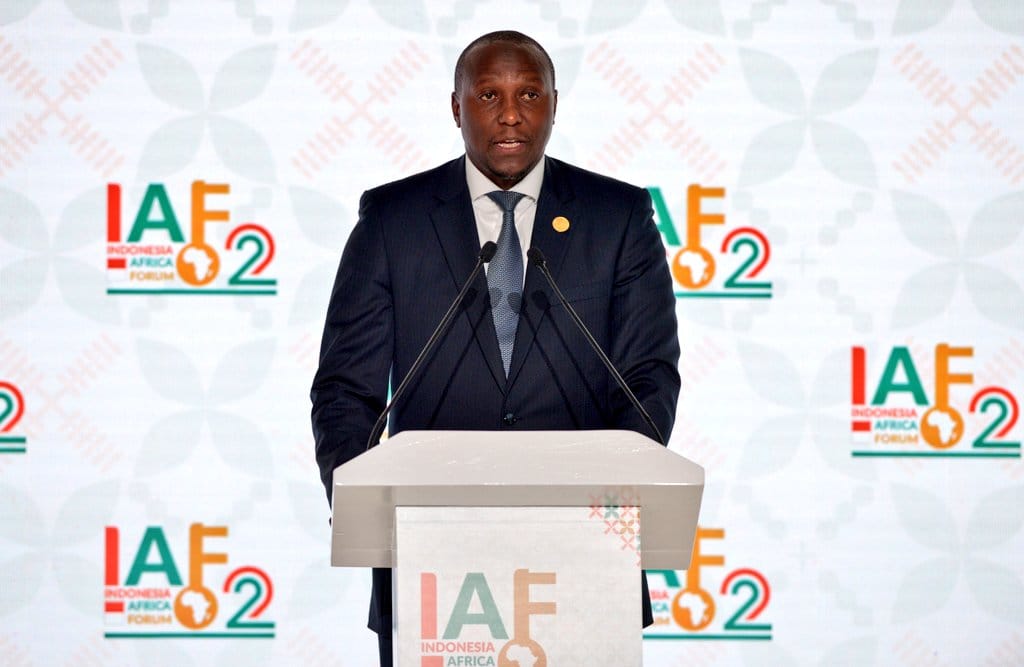by Ncaba Ntshakala
During the 2nd Indonesia-Africa Forum held in Bali under the theme “Driving Economic Growth: Eswatini’s Journey in Harnessing the Service Sector,” Prime Minister Russell Dlamini highlighted the significant strides Eswatini has made in developing its service sector over the past decade.
Dlamini when speaking on behalf of His Majesty King Mswati III, who was unable to attend due to cultural commitments in the Kingdom of Eswatini, conveyed the King’s warmest regards to the President and people of Indonesia.
He also expressed deep gratitude to the Indonesian government for their hospitality and the excellent reception extended to the Eswatini delegation.
In his address, the Premier attributed Eswatini’s progress in financial services, telecommunications, and healthcare to proactive government policies and the natural evolution of the nation’s economy.
RELATED: Prime Minister bids farewell to outgoing British High Commissioner
He emphasized that since gaining independence, the Eswatini government has prioritized investments in tertiary education, focusing on fields such as Social Sciences, Humanities, and Commerce.
These areas of study have traditionally led to employment in the public sector and have contributed significantly to the country’s economic growth. Education and health continue to command a substantial portion of the national budget, reflecting their importance in Eswatini’s development agenda.
The Prime Minister pointed out that these investments have yielded a highly skilled workforce that forms the backbone of the thriving service sector.
To attract more Foreign Direct Investment (FDI), the Prime Minister outlined several measures the government has implemented to create a more conducive business environment.
A notable initiative is establishing a One-Stop Business Centre at the Royal Science and Technology Park, which streamlines business registration, licensing, and compliance processes.

Plans are also underway to launch a comprehensive One-Stop Business Portal, reducing bureaucracy.
Additionally, the government offers attractive investment incentives, including tax breaks, factory shells, and other supportive mechanisms designed to entice foreign companies.
However, Prime Minister Dlamini acknowledged the challenges posed by global economic conditions and a shrinking job market.
He noted that Eswatini now produces more graduates than the domestic market can absorb. Fortunately, as an English-speaking nation, Eswatini’s skilled graduates are finding opportunities abroad in countries such as Taiwan, the United Kingdom, and South Africa, among others.
The Prime Minister sees this talent pool as an asset and is keen to leverage it to attract more FDI. To align education with market needs, Eswatini is actively seeking collaborations with educational institutions in Indonesia and beyond for specialized, industry-focused training programs.
The government is focused on establishing vocational training centres in sectors such as tourism, renewable energy, the Internet of Things, and Information Technology (IT).
RELATED: Prime Minister visits Minsk Dairy Plant No.1 in Belarus
National skills development programs, implemented in partnership with international entities, are also a priority to ensure the competitiveness of Eswatini’s workforce in high-demand areas.
The Prime Minister highlighted Eswatini’s rich cultural heritage, resilience, and unyielding spirit, which define the nation despite its land-linked geography.
Bordered by economic giants like South Africa and Mozambique, Eswatini views its location as an opportunity rather than a limitation.
The country’s unique offerings, including cultural festivals, wildlife reserves, and eco-tourism opportunities, present significant potential in the tourism sector.
The government is eager to partner with investors to develop luxury eco-lodges and adventure tourism facilities that cater to high-spending tourists.

The Premier shared that Eswatini enjoys significant market access to Africa and beyond through agreements under the Southern African Development Cooperation (SADC), the Common Market for East and Southern Africa (COMESA), and the African Continental Free Trade Area (AfCFTA).
Additionally, market penetration into European and American markets is facilitated through bilateral arrangements.
According to the Prime Minister, any investor in the Kingdom will benefit from this extensive market access.
Dlamini also discussed the stability and peaceful environment enhanced by Eswatini’s Tinkhundla system of government, which blends Western and traditional governance.
This unique model has created a thriving private sector and an environment conducive to innovation.
To build the country’s global image, targeted Public Relations campaigns are being launched to showcase Eswatini’s stability, growth potential, and strategic location.
By highlighting success stories from foreign investors and through the “Nkwe” policy, which recognizes companies contributing to economic development, he shared that the government is signalling that Eswatini is open and ready for business.
In recent years, Dlamini said that Eswatini’s services sector has significantly transformed. The financial services sector has become a gateway to inclusion, expanding access to banking, insurance, and mobile payments across the Kingdom.
The telecommunications infrastructure, exemplified by the cutting-edge Science and Technology Park, ensures that every citizen and business is equipped to succeed in an evolving world.
To sustain this momentum, the Prime Minister asserted that the government has recently updated key policies, such as the Industrial Policy for Eswatini 2023-2033, which aligns with the National Development Goals and aims to fast-track industrial development and enhance competitiveness.
“The Investment Policy is designed to create a more conducive environment for both domestic and foreign investors, driving economic growth, diversification, and sustainable development,” he said.
“The Trading Licenses Amendment Act streamlines business processes to encourage entrepreneurship and investment, while the Shop Hours Act introduces flexibility to meet modern economic demands while respecting cultural traditions.”
These initiatives are only the beginning. The government was said to be committed to further investing in digital infrastructure, enhancing regulatory frameworks, and prioritizing skills development and training.
Public-private partnerships are being enhanced to encourage innovation and improve service delivery, positioning Eswatini as a hub of excellence in the services sector.


